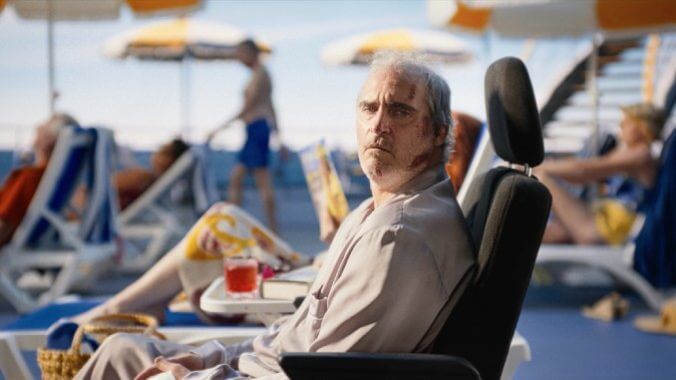Joaquin Phoenix and the Bodily Cost of Loneliness

There is an unassuming rigidity which possesses Joaquin Phoenix in all of his performances, like the coldness of the world has seeped in and made his limbs brittle and askew. His depiction of Leonard in James Gray’s Two Lovers carefully exemplifies this. In the opening moments, he plunges into a Brooklyn stream, briefly subsumed by waves of freezing cold grief, implied to be one in a series of attempts to take his own life. After he is rescued by passers-by, he plods home, struggling under an invisible weight which presses down on him—on us. Phoenix slumps forward, his ill-fitting shirt falls over his arms and sits taut against his shoulders; engulfed by the clothes he wears, he is physically dragged into the ground.
Loneliness undercuts all of Phoenix’s films, including his most recent venture Beau Is Afraid, where he makes this career-long preoccupation explicit; embodying someone who is literally splintered across time and space. But this ability to channel aimlessness can be undermined by directors who confuse pessimism for depth. Gray’s seemingly dour take on unrequited love in Two Lovers is tinged with a shade of possibility, hopefulness only discernible in the cloudy blur of mid-winter. Late in the film, Leonard is talking to his father (Moni Moshonov) about the prospect of a New Year’s swim in the sea. “Be careful, Pap” he warns. “I will” his father responds, a softer rendering of Leonard’s earlier experience, a callback to the encroaching waves he once swam towards and against. Advice born from intimate experience, passed on to ensure his father feels less alone.
Phoenix’s next collaboration with Gray would be similarly defined by solitude. In The Immigrant, Bruno is seemingly better connected than Leonard, armed with a makeshift family of vulnerable people. In reality, he has sequestered himself away from the world, siphoning off women and wielding them for financial gain. Early in the film, his unsettling loneliness is revealed when he reaches out to embrace Ewa (Marion Cotillard), before she steps back, bumping into the rickety furniture, spurning his advances. He erupts, staging an intervention with the other sex workers, forcing them to bear witness to one another’s pain in fittingly performative ways. The connections are flimsy and unearned, crumbling under the weight of the state as the government cracks down on those who are living in New York illegally. Still this loneliness serves the story, necessary to his eventual moral discovery at the end of the film. Phoenix’s performance in both of Gray’s projects are defined by the move from distant observation to involved commitment; his characters are forced to reckon with how their isolation impacts those around them. Both end after imparting their protagonists with a newly complicated understanding of the world.
-

-

-

-

-

-

-

-

-

-

-

-

-

-

-

-

-

-

-

-

-

-

-

-

-

-

-

-

-

-

-

-

-

-

-

-

-

-

-

-








































